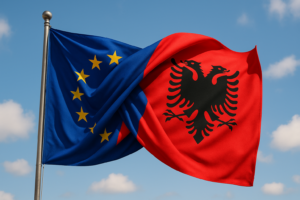Headquarters: Svetog Nauma 7, 11000
Office address: Đorđa Vajferta 13, 11000
Phone:: +381 11 4529 323

The much-anticipated draft report on Serbia of the European Parliament’s Committee on Foreign Affairs (AFET) has finally been published. What is so outstanding about it is that it covers a very turbulent period for Serbia – no chapters were opened for the first time since the accession talks begun in 2014, while the National Assembly was left without any opposition after the 2020 elections. Yet, the moment one starts reading the draft report, it becomes clear that this draft will witness numerous amendments to it – because it is too soft!
Namely, article 2 of the draft report underlies that “the momentum created by the new mandate following the 21 June 2020 elections in Serbia is an opportunity to make important progress towards Serbia’s European perspective.” It is certainly disappointing that Mr. Vladimír Bilcík, the author of this draft report, and Rapporteur on Serbia, missed the opportunity to indicate that the 2020 parliamentary elections have had nothing to do with the European values and idea of representative democracy. In that regard, the European Commission 2020 Report on Serbia warned that “voter choice was limited by the governing party’s overwhelming advantage and the promotion of government policies by most major media outlets”. The same report added that the election results were “not conducive to political pluralism”. Therefore, Mr. Bilcík’s attempt to present the post-electoral situation in Serbia as a momentum is a clear sign of a biased political reporting. Such reporting is dangerous, as paying lip-service to the ruling elites of Serbia which can only encourage a continuation of the existing practices.
Furthermore, the fact that the draft report advocates for “the opening of additional negotiating chapters as Serbia makes the necessary commitments to reform” is regrettable as well – particularly as the EU needs to stop focusing on commitments, but on implementation. In that regard, opening chapters with Serbia would send a wrong signal, and thus reward Serbia for the lack of credible progress towards its path to the EU. In fact, the European Policy Centre (CEP) has published an infographic, based on the assessments made by the European Commission 2020 annual report on Serbia, which showcases that Serbia achieved a lower level of progress compared to the 2019 Report in crucial areas of public administration reform, judiciary and the fight against organized crime. In addition, the same infographic showcases that Serbia’s level of preparation in terms of political criteria has stagnated since 2016, while noting that there is no progress whatsoever in terms of media freedoms since 2015. Therefore, calling the Council of the EU to open more chapters with Serbia, at a time when the comprehensive rule of law reform is lacking, would be a dangerous sign that the European Parliament simply does not care about the Fundamentals anymore. These calls are even more confusing, particularly considering that Mr. Bilcík did note in the later parts of the draft report that there is lack of progress on media freedom, as well as structural shortcomings in the area of rule of law.
The attempt of Mr. Bilcík to “soften” the report cannot be explained other than by his party allegiance to the European People’s Party (EPP), whose associate member is the ruling party of Serbia, the Serbian Progressive Party (SNS). Long has the EU been accused of providing “external support to regimes that include considerable shortcomings in terms of democratic governance for the sake of the (false) promise of stability” (hence, the term “stabilitocracy”). If the final report keeps the statement on the so-called “momentum” in the aftermath of Serbia’s parliamentary elections, as well as its call to open more chapters without merit, it will show that it openly endorses the way Serbia conducts its politics – in the style of a “hybrid regime” (as defined by the Freedom House in 2020). In that case, it will become certain that the European Parliament has lost its edge – that is its reputation for being an EU institution with the most liberty to say things as they are.
Nevertheless, not everything in this draft report is unsubstantiated. The fact that it stresses “the importance of strategic communication on EU accession by Serbian stakeholders”, while adding that “public discussion about EU accession must be based on facts”, represents a clear criticism of Serbia’s behaviour during the COVID-19 pandemic. Not only did the Serbian President, during a national emergency broadcast, argue that the European solidarity is “a fairy tale”, but he also went as far to kiss the Chinese flag and systemically praise Chinese as a “brotherly” nation. The Commission Report 2020 on Serbia rightfully noted that Serbia’s rhetoric at that time was clearly pro-China and Eurosceptic.
It is also refreshing to see that the draft report goes into geopolitical specifics as well. It notably expresses concern over Serbia’s “increasing dependence on defence equipment and technologies from China”, as well as over Serbia’s “close political and military cooperation with Russia”. Considering that in 2019 the EU labelled China as a “systemic rival” promoting alternative models of governance, while Russia is seen as EU’s traditional rival in the region, Mr. Bilcík’s effort to insert a stronger geopolitical component in the draft report is something that can give further weight to the European Parliament, an EU institution that is typically side-lined in terms of geopolitics.
Photo: www.concernhealth.com